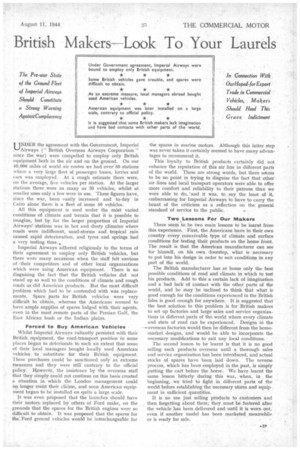British Makers Look To Your Laurels
Page 25

If you've noticed an error in this article please click here to report it so we can fix it.
UNDER the agreement with the Government, Imperial Airways (" British Overseas Airways Corporation " since the war) were compelled to employ only British equipment both in the air and on the ground. On our 40,000 miles of world air routes we had over 50 stations where a very large fleet of passenger buses, lorries and cars was employed. At a rough estimate there were, on the average, five vehicles per station. At the larger stations there were as many as 20 vehicles, whilst at smaller ones only a few were in use. These figures have, since the war, been vastly increased and to-day in Cairo alone there is a fleet of some 50 vehicles.
All this equipment is used under the most varied conditions of climate and terrain that it is .possible to imagine, but by far the larger proportion Of Imperial Airways' stations was in hot and dusty climates where roads were indifferent, sand-storms and tropical rain caused rapid deterioration, and tyres and springs had a very testing time.,
Imperial Airways adhered religiously to the terms of their agreement to employ only British vehicles, but there were many occasions when the staff felt envious of their competitors and of other local organizations which were using American equipment. There is no disguising the fact that the British vehicles did not stand' up so well to the conditions of climate and rough roads as did American products. But the most difficult problem which had to be contended with was replacements. Spare parts for British vehicles were very difficult to obtain, whereas the Americans seemed to have ample supplies of spares lodged with their agents, even in the most remote parts of the Persian Gulf, the East African bush or the Indian plains.
Forced to Buy American Vehicles •
Whilst Imperial Airways valiantly persisted with their British equipment, the road-transport position in some places began to deteriorate to such an extent that some of their local managers bought locally used American vehicles to substitute for their British equipment. These purchases could be sanctioned only as extreme measures and they were still contrary to the official policy. linwever, the insistence by the overseas staff that they simply could not continue on this basis created a situation in which the London management could no longer resist their cairns, and soon American equipment began to be installed on quite a large scale.
It was even proposed that the launches should have their motors replaced by others of Ford make, on the grounds that the spares for the British engines were so difficult to obtain. It was proposed that the spares for the:Ford ground vehicles would be interchangeable for
the spares in marine motors. Although this latter step was never taken it certainly seemed to have many advantages to recommend it.
This loyalty to British products certainly did not enhance the reputation of this air line in different parts of the world. These are strong words, but there seems to be no point in trying to disguise the fact that other air lines and local transport operators were able to offer more comfort and reliability to their patrons than we were able to do, 'and it was, to say the least of it, embarrassing for Imperial Airways to have to carry the brunt of the criticism as a reflection on the general standard of service to the public.
Two .Lessons For Our Makers
There seem to be two main lessons to be learnt from this experience. First, the Americans have in their own country every conceivable type of climate and surface conditions for testing their products on the home front. The result is that the American manufacturer can see for himself, on his own doorstep, what is necessary to put into his design in order to suit conditions in any part of the world.
The British manufacturer has at home only the best possible conditions of road and climate in which to test his products. Add to this a certain lack of ithagination and a bad lack of contact with the other parts of the world, and he may be inclined to think that what is good enough for the conditions experienced in the British Isles is good enough for anywhere. It is suggested that the best solution to this problem is for British makers to set up factories and large sales and service organiza tions in different parts of the world where every climate and state of road can be experienced. Designs in the — overseas factories would then be different from the homemarket designs, and would be able to incorporate the necessary modifications to suit any local conditions.
The second lesson to be learnt is that it is no good selling such products overseas until a thorough sales and service organization has been introduced, and actual stocks of spares have been laid down. The reverse process, which has been employed in the past, is simply putting the cart before the horse. We have learnt the same lesson bitterly during this war, when, in the beginning, we tried to fight in different parts of the world before establishing the necessary stores and equipment in sufficient quantities.
It is no use just selling products to customers and then forgetting about them; they must be fostered after the vehicle has been delivered and until it is worn out, even if another model has been marketed meanwhile or is ready for sale.




















































